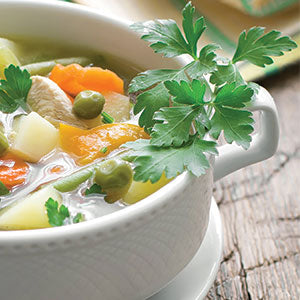
Cold and Flu-Fighting Foods: What to eat, what to avoid
Written By Stephanie Raymond
Cold and flu season has arrived! Learn the best (and worst) foods to eat when you're sick.
—and along with it so have sniffles, sore throats, and achy muscles. If a cold or flu bug has you in its grip, what you eat may make a big difference in how quickly you recover.
While eating right is important all year round, a healthy diet full of nutrient-rich whole foods such as fresh fruits and vegetables is especially important when fending off symptoms of the cold and flu. The following are some of the best and worst foods to eat when feeling under the weather.
The best
Chicken soup
Used for centuries to soothe symptoms associated with the cold and flu, chicken soup’s healthy reputation may be attributed to the many nutrient- and antioxidant-dense ingredients it contains.
These ingredients often include polyphenol-packed onions, beta carotene-rich carrots, virus-fighting garlic, and, of course, chicken.
Chicken is an excellent source of the compound carnosine. Preliminary studies have found carnosine to have antioxidant and anti-inflammatory properties that may stave off viral infections such as the flu by stopping it from replicating and spreading inside cells.
The comforting warm broth of this soup may also help loosen mucus to ease congestion and alleviate a sore throat. Garlic Thought to ward off everything from vampires to the plague, garlic has a long history of protecting us against all that ails. Garlic’s disease-fighting abilities appear to come from the sulphur compounds responsible for its pungent smell. In addition to demonstrating powerful antioxidant abilities, garlic is thought to have antimicrobial and antiviral properties that preliminary research suggests may be useful in battling the common cold. Citrus fruit Well known as excellent sources of vitamin C, citrus fruits such as oranges, grapefruits, and lemons may help the immune system stay in tip-top shape. While evidence regarding vitamin C’s ability to combat the cold is inconclusive, vitamin C is thought to be a potent antioxidant that plays an essential role in maintaining the immune system. Another powerful antioxidant found in citrus fruits is the flavonoid quercetin. Like carnosine in chicken soup, preliminary studies suggest quercetin may stop the rhinovirus in its tracks by preventing it from replicating and spreading. The rhinovirus is the most common cause of the common cold.
Garlic
Thought to ward off everything from vampires to the plague, garlic has a long history of protecting us against all that ails. Garlic’s disease-fighting abilities appear to come from the sulphur compounds responsible for its pungent smell.
In addition to demonstrating powerful antioxidant abilities, garlic is thought to have antimicrobial and antiviral properties that preliminary research suggests may be useful in battling the common cold.
Citrus fruit
Well known as excellent sources of vitamin C, citrus fruits such as oranges, grapefruits, and lemons may help the immune system stay in tip-top shape. While evidence regarding vitamin C’s ability to combat the cold is inconclusive, vitamin C is thought to be a potent antioxidant that plays an essential role in maintaining the immune system.
Another powerful antioxidant found in citrus fruits is the flavonoid quercetin. Like carnosine in chicken soup, preliminary studies suggest quercetin may stop the rhinovirus in its tracks by preventing it from replicating and spreading. The rhinovirus is the most common cause of the common cold.
Cranberries
Although small in size, cranberries are abundant in phytochemicals that may give the immune system a big boost.
In one preliminary study, researchers found cranberry juice significantly increased the cells responsible for defending the body against viral invaders in participants who drank it daily. During the study, the cranberry juice drinkers reported fewer cold and flu symptoms than those who did not drink the juice.
Like citrus fruit, cranberries are also a good source of vitamin C and the flavonoid quercetin.
Camomile tea
Traditionally used to calm nerves and relieve digestive upset, preliminary research suggests a cup of camomile tea may be helpful in combatting the common cold.
British researchers have found camomile tea may increase levels of polyphenols associated with increased antibacterial activity in the body. This increase in antibacterial activity may aid the immune system in warding off infections associated with the common cold.
Dark chocolate
If a cold has left you with a nagging cough, a dose of dark chocolate may help. Dark chocolate is especially rich in the phytochemical theobromine.
UK researchers have found theobromine may be more effective than codeine in relieving a persistent cough. Theobromine is thought to work by blocking the action of the nerves that trigger the cough reflex.
The worst
Fast food
While eating fast or highly processed food is never recommended, indulging in a fatty burger and fries when sick may hamper the immune system’s ability to do its job.
In one review, American researchers from the National Institutes of Health found foods high in refined sugar, salt, and certain fats may wreak havoc on the body by increasing inflammation and decreasing the body’s defences against infections.
Refined sugar
When consumed in excess, refined sugar found in candy, pastries, soft drinks, and other sweet treats may reduce disease-fighting white blood cells and slow the immune system’s response to invading bacteria and viruses.
Alcohol
A hot toddy or two before bed may provide momentary relief, but could leave you feeling worse in the morning. Alcohol’s diuretic properties can cause dehydration in the body. As the body needs adequate fluids to break down mucus, dehydration may make cold symptoms such as congestion worse.
Too much alcohol has also been shown to weaken the immune system against invading viruses.
Coffee
Like alcohol, coffee is thought to have diuretic properties that can cause dehydration. Excess caffeine consumption is also thought to promote the release of stress hormones. High levels of stress hormones can increase inflammation, which can make cold and flu symptoms seem more severe.
Dairy
Packed full of protein, calcium, vitamin D, and in some cases probiotics, dairy products may seem like a healthy choice. Unfortunately, for some individuals, dairy may make cold and flu symptoms seem even worse.
While evidence doesn’t support the notion that dairy products increase mucus production, dairy products may still make the mucus already present in the throat feel thicker.
Stay healthy
Don’t fall prey to a cold or flu bug. These simple strategies may help you avoid getting sick this cold and flu season.
• Wash your hands frequently—and thoroughly—or use an alcohol-based hand sanitizer throughout the day. This can help protect you from any virus particles you may pick up.
• Avoid touching your eyes, nose, and mouth.
• Regularly clean frequently touched items at home and work such as phones, keyboards, and door handles.
• Don’t smoke, and avoid second-hand smoke. Smoke exposure not only weakens the immune system, but dries out nasal passages and may paralyze cilia, the tiny hairs in the nose that sweep cold and flu viruses away.
• Exercise and meditate. One small study found that meditation combined with moderate exercise such as yoga reduced cold and flu symptoms in participants by 40 to 50 percent.
Super supplements
In addition to a healthy diet, plenty of fluids, and rest, nutritional and herbal supplements may aid the body in combatting invading viruses and help speed up recovery.
Elderberry
Thought to have anti-inflammatory and antiviral properties, elderberry may help ease congestion by reducing swelling in mucous membranes.
Echinacea
Although research is still evolving on its many benefits, when taken at the first signs of a cold, echinacea may help reduce symptoms.
North American ginseng
When taken regularly throughout the cold and flu season, research suggests North American ginseng may not only help prevent the cold and flu, but also make symptoms milder in those who do get sick.
Probiotics
Thought to work by reducing the body’s inflammatory response to an invading virus, probiotic supplements may help lessen the duration of cold symptoms.
Spirulina
Although evidence is preliminary, antioxidant-rich spirulina may provide protection against the flu by stopping the flu viruses from replicating.
Zinc
When taken within a day of symptoms starting, zinc may help speed up recovery from a cold as well as lessen the severity of symptoms.
